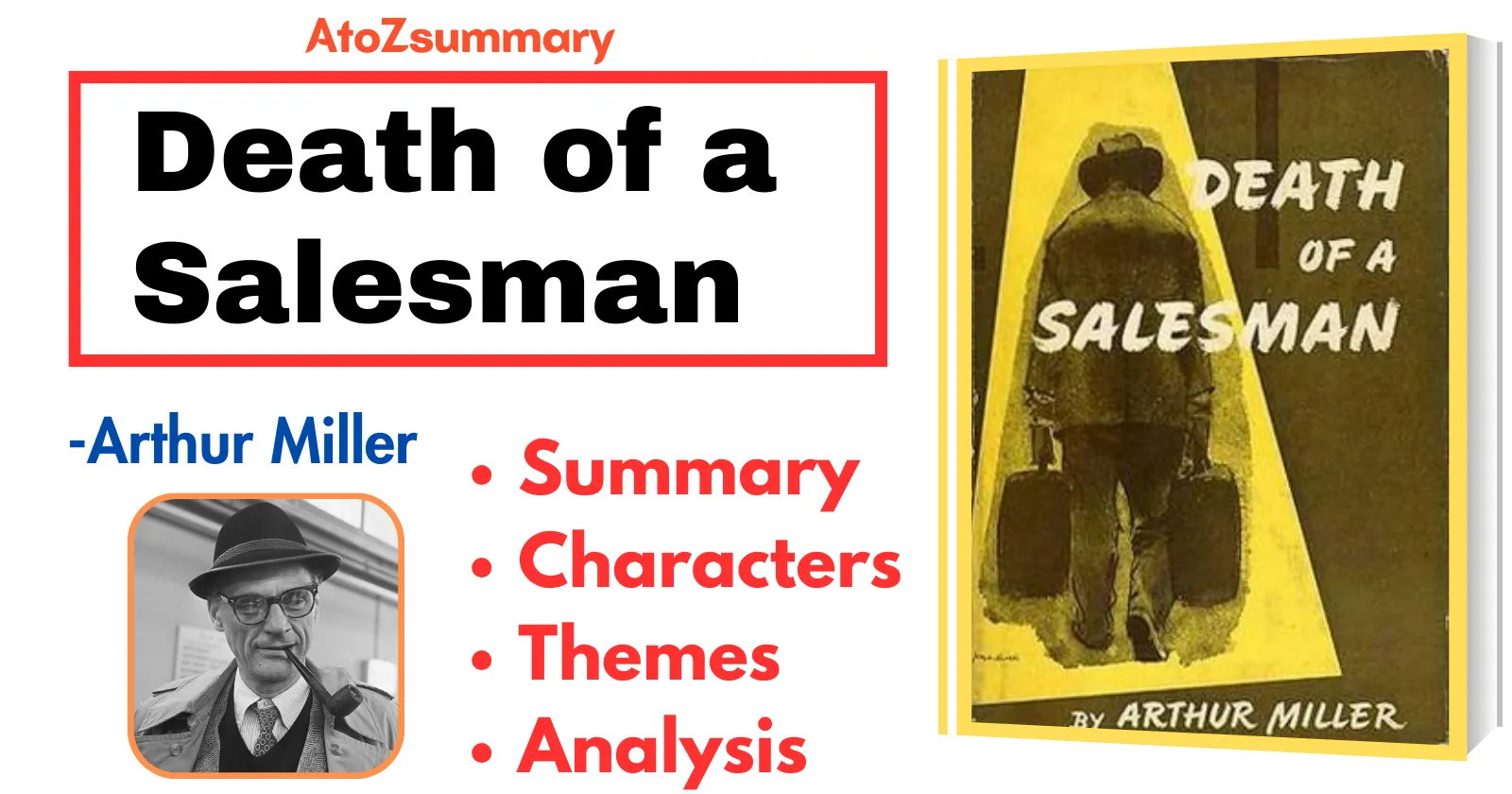About the Play: Death of a Salesman
| Title | Death of a Salesman |
|---|---|
| Author | Arthur Miller |
| Genre | Tragedy |
| Premiere | February 2, 1949 |
| Setting | 1940s, Brooklyn, New York |
| Tone | Tragic, reflective, and critical |
| Symbolism | Rubber hose, diamonds, the jungle imagery |
| Major Conflicts | Willy’s struggle to live up to the American Dream, Willy’s strained relationship with his sons, Willy’s deteriorating mental state |
| Key Events | Willy’s flashbacks to his past, Biff’s visit to Boston, Willy’s death |
| Critical Reception | Initially controversial, but now considered a masterpiece of American theater |
| Awards | -Pulitzer Prize for Drama (1949) -Tony Award for Best Play (1949) |
Analysis: Death of a Salesman
“Death of a Salesman” by Arthur Miller is a classic American play that explores the life of Willy Loman, a traveling salesman who struggles with the American Dream. The play delves into themes of family, identity, and the pursuit of success. Willy’s belief in the importance of being well-liked and successful leads to his downfall as he grapples with reality and his own perceptions. The play is a poignant commentary on the pressures of societal expectations and the human cost of the relentless pursuit of material success.
Characters: Death of a Salesman
The characters of “Death of a Salesman” by Arthur Miller are:
- Willy Loman: The protagonist and a traveling salesman who struggles with his perception of success and his relationships with his family.
- Linda Loman: Willy’s loyal and supportive wife who tries to keep the family together despite financial and emotional challenges.
- Biff Loman: Willy’s eldest son, who grapples with his father’s expectations and his own desire for a meaningful life.
- Happy Loman: Willy’s younger son, who seeks success and validation, often overshadowed by Biff.
- Ben Loman: Willy’s deceased brother, who appears in Willy’s fantasies as a successful and adventurous figure.
- Charley: Willy’s neighbor and friend, who contrasts with Willy in terms of success and practicality.
- Bernard: Charley’s son, who grows up to be a successful lawyer and contrasts with the struggles of the Loman family.
- The Woman: A character from Willy’s past who represents infidelity and the consequences of his choices.
Themes: Death of a Salesman
The themes of “Death of a Salesman” by Arthur Miller are:
- American Dream and Success: The play explores the pursuit of the American Dream and the impact of societal expectations on individuals.
- Family and Relationships: The strained relationship between the protagonist, Willy Loman, and his family is a central theme, highlighting the consequences of neglect and unrealistic expectations.
- Illusion vs. Reality: The play delves into the contrast between Willy’s illusions of success and the harsh reality of his life, illustrating the consequences of living in denial.
- Capitalism and its Discontents: “Death of a Salesman” critiques the dehumanizing effects of a capitalist society, where worth is often measured solely in terms of material success.
- Identity and Self-worth: Willy’s struggle to define his identity and find self-worth beyond societal expectations is a recurring theme, exploring the impact of external pressures on individual self-perception.
Watch Full Play Summary of Death of a Salesman
Death of a Salesman Summary
The play starts on a night after a botched sales trip, Willy Loman arrives home in Brooklyn to the sound of a flute tune. In an attempt to save him from having to fly, his wife Linda convinces him to petition Howard Wagner, his boss, for permission to work in New York. Willy promises to speak with Howard the following day. When his elder son Biff returns home to visit, Willy laments that he hasn’t succeeded in life. Willy walks to the kitchen to get a snack after Linda chastises him for being so critical.
Biff and his younger brother, Happy, who is also in town, reminisce about their youth and chat about their father’s rambling, which frequently includes criticism of Biff’s inability to live up to Willy’s standards, as Willy is talking to himself in the kitchen. Willy has a fantasy in which Biff and Happy, who are unhappy with their life, talk about purchasing a ranch in the West. He gives his younger boys credit for cleaning his automobile.
A youthful Happy and the high school football star Biff make an appearance. Their father, who recently returned from a business trip, lovingly engages with them. Willy confides in Biff and Happy that he plans to create a larger company than Charley’s, his neighbor, one day. Bernard, Charley’s son, walks in seeking Biff, who has to do well in math class to avoid failing. Willy tells his boys that while Bernard is intelligent, he is not “well-liked,” which will ultimately harm him.
When a younger Linda shows up, the lads go outside to do some chores. Linda manipulates Willy into admitting that his sales trip was moderately successful, despite his extravagant claims of accomplishment. Willy laments that he won’t have enough money soon to pay for their car and appliances in full. He bemoans the fact that he is disliked by others and that his work is subpar. His mistress’s laughter reaches his ears as Linda comforts him. He walks up to The Woman, who is still laughing, and they have another nostalgic reverie. The Woman and Willy make out while she expresses gratitude to him for her stockings.
The Woman vanishes, and Willy slips back into the kitchen, his previous daydream. Linda comforts him, now stitching stockings. He tells her to discard the stockings and chastises her for trying to fix them. Bernard charges in, searching for Biff once more. Willy is reminded by Linda that Biff needs to give back the football he took, and she also says that Biff treats the neighborhood females too roughly. Willy erupts at Bernard and Linda after hearing The Woman laugh. They both go, but Willy keeps muttering to himself even after the daydream comes to an end. Happy, who is older, walks downstairs and attempts to calm Willy down.
Agitated, Willy expresses his sorrow at not accompanying his brother Ben to Alaska, who later discovered a diamond mine in Africa and became wealthy. Charley walks in after hearing the disturbance. After Happy heads off to bed, Willy and Charley start playing cards. Willy turns down Charley’s offer of a job because he finds it offensive. Willy imagines that Ben walks in while they dispute. By mistake, Willy gives Charley Ben’s number. After examining Willy’s home, Ben informs him that he must board a train shortly to view properties in Alaska. When Willy mentions visiting Alaska to Ben, Charley becomes perplexed because no one else appears to be there and starts asking inquiries of Willy.
Charley flees after hearing Willy’s outburst. Ben greets the younger Linda as she walks in. Ben is asked eagerly about his life by Willy. Ben talks about their father and shares stories from his trips. Willy is daydreaming even more as Ben prepares to depart when Charley and Bernard burst in to inform him that Biff and Happy are stealing lumber. Ben finally departs, but Willy keeps in contact with him.
When the elder Linda returns, she discovers Willy outside. Happy and Biff go downstairs to talk to their mother about Willy’s illness. Linda chastises Biff for his unkind assessment of Willy. Biff informs her that he is aware Willy is not real, but he won’t go into further detail. Willy has attempted suicide, according to Linda. Happy becomes enraged and chastises Biff for his lack of success in the business sector. When Willy walks in, he shouts at Biff. Happy steps in and ultimately suggests that he and Biff start a sporting goods company together. Willy instantly cheers up and provides Biff with a lot of advice on how to approach Bill Oliver, one of Biff’s former colleagues, about requesting a loan. Everyone eventually goes to bed after more arguments and reconciliation.
Willy is shown in Act II savoring the meal Linda prepared for him. Willy considers the promising future before losing his temper over his pricey gadgets once more. Linda tells Willy that they are going out to supper with Biff and Happy that evening. Willy, full of enthusiasm, declares that he is going to force Howard Wagner to provide him with a position in New York. When the phone rings, Linda answers and speaks with Biff, telling him to treat his father nicely that evening at the restaurant.
The scene shifts from Linda to Howard fiddling with a wire recorder in his office as the lights go off. When Willy tries to bring up the topic of working in New York, Howard cuts him off and forces him to see his wife and children on the wire recorder. When Willy does manage to get through, Howard dismisses his request. Willy begins a long-winded reminiscence on how he was motivated to pursue a career in sales by the great Dave Singleman. After Howard goes, Willy becomes irate. Soon after, Howard reappears and urges Willy to take a break. Ben comes after Howard has left, asking Willy to come live with him in Alaska. Willy is reminded of his career and sons by the younger Linda when she walks in. When the youthful Biff walks in, Willy compliments him on his prospects and his popularity.
Bernard enters, anticipating Biff’s big football game, as Ben exits. Regarding the game, Willy speaks to Biff with optimism. When Charley walks in, he makes fun of Willy for the game. A new area of the stage sees its lights come up as Willy pursues Charley away. Off-stage, Willy keeps shouting, so Jenny, Charley’s secretary, begs an adult Bernard to stop him. Enter Willy, who starts babbling about some “very big deal” that Biff is working on. Astonished by Bernard’s accomplishments (he tells Willy he’s heading to Washington to take up a legal matter), Willy queries Bernard as to why Biff ended up being such a failure. Willy is questioned by Bernard about what transpired in Boston that led Biff to decline summer school. Reluctant to take the responsibility, Willy tells Bernard not to.
Charley walks in and bids Bernard farewell. Charley provides Willy with a job once again when he requests more money than he often lends him. After declining once more, Willy ultimately informs Charley that he has been sacked. Charley hands Willy the money furiously, reprimanding him for his constant need to be loved. Willy, on the edge of tears, calls Charley his only buddy and leaves.
Happy assists waiter Stanley at Frank’s Chop House with setting a table. A girl, Miss Forsythe, walks into the restaurant and everybody starts chatting and staring at her. Happy continues to flirt with Miss Forsythe as Biff walks in and she introduces him to her. When call girl Miss Forsythe goes to contact another call girl (per Happy’s request), Biff reveals that he waited six hours for Bill Oliver and that Oliver didn’t even acknowledge him. Disturbed by his father’s persistent misperception that he, Biff, worked as an Oliver salesman, Biff intends to dispel Willy’s delusions. When Willy walks in, Biff attempts to explain what occurred in Oliver’s office to him gently at first. Willy says without thinking, “I got fired.” Startled, Biff attempts to disappoint Willy once more. Happy interrupts to say that Biff is doing well, and Willy is excited to hear the good news.
At last, Biff lashes out at Willy for not wanting to listen. When the little Bernard enters the room crying out for Linda, Biff, Happy, and Willy begin to fight. Their chat fades into the background as Biff describes what transpired. Linda is informed by the youthful Bernard that Biff failed math. When the conversation at the table resumes, Willy chastises Biff for his poor arithmetic performance. The Boston hotel operator’s voice is then heard by Willy, who yells that he is not in his room.
In an attempt to calm Willy down, Biff says that Oliver is discussing paying Biff the money with his partner. Biff is increasingly irritated with Willy’s rekindled interest and his follow-up inquiries, and he yells at him. When Willy hears The Woman chuckle, he yells out at Biff, knocking him down and sending him flying. Letta, another call girl, and Miss Forsythe walk in together. After assisting Willy to the restroom, Biff confronts Happy about Willy after observing him making out with the females. Happy and the girls follow as Biff rushes away.
Entering, dressed to impress, are Willy and The Woman. Willy quickly follows The Woman into the restroom as the door knocks. When the young Biff opens the door and informs Willy that he failed arithmetic, Willy answers it. When Biff mimics his math teacher’s lisp, Willy and The Woman laugh, defying Willy’s attempts to get him out of the room. Even though Willy makes an effort to hide his transgression, Biff doesn’t buy it and leaves in a depressed manner, branding Willy a “phony little fake.” Stanley assists Willy once they are back inside the restaurant. Where can I find a seed shop, Willy asks. Stanley points him on the right path, and Willy quickly leaves.
Happy enters the Loman kitchen in search of Willy as the light turns on. As he enters the living room, Linda is there. When Biff enters, Linda smacks Happy’s hand with the flowers and chastises the boys. She screams at them for leaving Willy behind. Happy tries to calm her down, but Biff heads off to find Willy. He discovers Willy using a lantern to plant seeds in the garden. Ben is being consulted by Willy on a $20,000 proposal. Biff attempts to get him inside as he approaches him to bid him farewell.
Biff follows Willy into the home, where Willy gets even more enraged by Biff’s shortcomings. Happy attempts to soothe Biff, but instead, he and Willy become enraged with one another. Willy feels touched as Biff begins to cry. Except for Willy, who continues talking to Ben despite everyone else going to bed, he is thrilled about how wonderful Biff will be with the $20,000 in insurance money. Willy is immediately called out by Linda, but she receives no answer. Happy and Biff also pay attention. They hear Willy’s vehicle go off.
Following Willy’s sparsely attended funeral, Linda and Happy are shown in astonishment during the requiem. Willy, according to Biff, had the wrong dreams. Charley argues that Willy is a victim of his line of work. Biff, all set to travel, asks Happy to accompany him back out west. Happy says he’s going to stay in New York to prove Willy’s death is legitimate. Linda begs Willy’s pardon for not being able to cry. She starts crying and says, “We’re free…” again. Everyone leaves, and the curtain drops to the sound of the flute tune.
FAQs
What is the main point of Death of a Salesman?
The play explores the tragic consequences of the American Dream’s obsession with success and popularity.
What is the main tragedy in Death of a Salesman?
Willy Loman’s pursuit of the American Dream leads to his downfall and tragic death.
What is the moral message of Death of a Salesman?
The moral message of “Death of a Salesman” is that chasing an unrealistic version of success can lead to personal and familial unhappiness.
What is ironic about Death of a Salesman?
Willy Loman, a man who values personal success, ends up destroying his family with his failures.
What is Willy Loman’s main goal in life?
To achieve success and recognition.
What is the cause of Willy’s death?
The cause of Willy’s death is suicide.
What is the significance of Willy’s flashbacks?
They reveal his past traumas and their impact on his present life.
What is the role of Biff Loman in the play?
He represents Willy’s unfulfilled dreams and disappointments.
What is the significance of the rubber hose in the play?
It symbolizes Willy’s escape from his troubled reality.
What happened at the end of Death of a Salesman?
After a life of chasing the illusive American Dream, Willy Loman commits suicide, hoping to leave a legacy of success for his son.
What is the play’s legacy?
Death of a Salesman is considered one of the most important American plays of the 20th century. It continues to be performed and studied today for its exploration of themes such as the American Dream, family dynamics, and the pursuit of happiness.





![The Catcher In The Rye Summary, Themes & Characters [by J. D. Salinger] The Catcher In The Rye Summary, Themes & Characters [by J. D. Salinger]](https://atozsummary.com/wp-content/uploads/2023/06/The-Catcher-In-The-Rye-Summary-Themes-Characters-by-J.-D.-Salinger.webp)

![Regretting You Summary, Themes, Synopsis & Characters [Book by Colleen Hoover] Regretting You Summary, Themes, Synopsis & Characters [Book by Colleen Hoover]](https://atozsummary.com/wp-content/uploads/2023/05/Regretting-You-Summary-Themes-Synopsis-Characters-Book-by-Colleen-Hoover-1024x576.webp)



